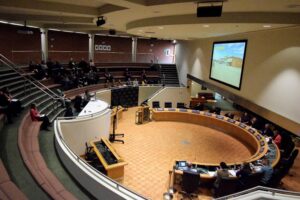Council pushing procedural change
By James Tubb on July 21, 2023.
 Changes are coming to how city council conducts business as councillors have suggested a dozen amendments to the city's "procedures Bylaw" that could be finalized next month. -- News File Photo
Changes are coming to how city council conducts business as councillors have suggested a dozen amendments to the city's "procedures Bylaw" that could be finalized next month. -- News File PhotoClark had previously discussed the procedure bylaw as a key avenue to improve efficiency and transparency at city hall, which formed central planks in her 2021 election campaign. Some changes are required because of updates in the Alberta Municipal Government Act, which lays down overarching rules for city operations and mandates. But Clark said she initially hoped the local bylaw could go beyond bare minimums required, defining city processes and improving clarity.
“It took a long time and is very similar to our old procedure bylaw and a lot of recitation of the MGA,” she said. “It came to us as a bylaw for comment, perhaps it would have been better driven by council discussion then made into a bylaw.” For example, provincial changes remove the requirement that a mayor be a member of all standing committees as a standard “ex-officio” status.
The draft written by the city solicitor’s office aligns with the MGA’s change. Councillors didn’t comment on the “ex officio” matter on Monday, and even suggested new limitations on non-member participation of committees. “Certainly that’s one area that most other council’s (in Alberta) would have the mayor have ex-officio status,” said Clark. “I’d like to get a better understanding from certain councillor’s why they think it’s important to take it out.” Whereas the original draft would see the mayor become an additional full-standing member of the public services committee (explained as a way to ensure quorum), a proposed change would set the size of all committees at three councillors.
Clark typically attends most meetings, either in person or via online conferencing, and all council members are able to attend any open or closed committee meeting. The procedure bylaw was introduced earlier this month and taken up Monday. Councillors amended the agenda to make public a list of more than 60 questions on the bylaw they put to administrators, and introduced 12 amendments or formal requests for clarification on second reading.
Several changes are to simple operating rules, such as streamlining records keeping, but others allude to growing frustration on council that meetings and council’s work is becoming bogged down. Among the changes, councillors directed the staff to write language to:
— Put a maximum time limit on closed in-camera meetings;
— Require a council vote when the mayor calls a recess;
— Require the mayor to solicit the opinion of council when cancelling a meeting or calling a special meeting of council. Council will also debate removing the mayor’s power to appoint councillors to standing committees — where most issues and program decisions are initially discussed. Instead appointments would be made by a majority vote of council. Some proposed changes refer to how council’s main committees interact with council. If approved, all reports received by any standing committee would be forwarded in their entirety to all councillors, not just executive summaries.
Coun. Robert Dumanowsk also moved that minutes format be changed. He said when the notes arrive at council the format of the minutes downplay opposing points in favour of staff recommendations. “It really stymies that discussion that happens at meetings, and obliterates, quite frankly, the goals of the standing committee system,” he said. “I’m quite passionate about this.” City manager Ann Mitchell told council the matter could be handled through a change in practice rather than having it written into the bylaw, and the motion was withdrawn. The current bylaw was passed in the early 1980s, and despite changes over the years, hasn’t been fully updated for more than 40 years.
Another would define some processes for individual councillors seeking to sponsor their own motions. A change would see requests for legal or financial advice related to motions handled by the city manager. 20
-19
1 Comment
Oldest




